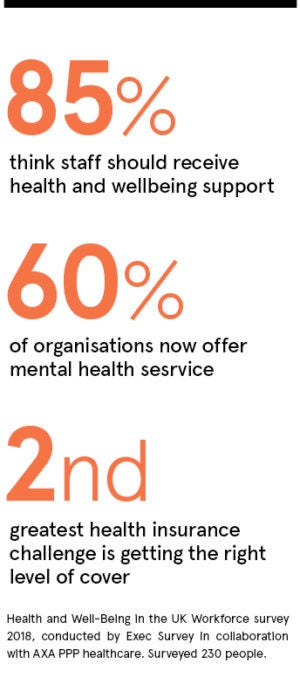There is little doubt that healthy and engaged employees are a significant driver of business success. As part of this, bosses must create a culture of openness and honesty that ensures health and wellbeing initiatives genuinely help employees. Yet traditionally many employers have fallen into the trap of making generalised assumptions about what their people need or want.
“In many situations, assumptions have driven organisations’ wellbeing strategies. As well-meaning as this might be, it often leads to a disconnect between what employees need and what businesses offer,” says Dr Mark Winwood, director of psychological services at AXA PPP healthcare. “Engagement is crucial if the health and wellbeing process is to work for each individual and deliver positive returns.’’
As the first step in personalisation, business owners should ask their employees what they want. They can canvass views through surveys, focus groups or simply informal discussions, helping to gain a reliable understanding of what employees really need in health and wellbeing benefits.
“There’s no sense in closing your office early on a Friday, for example, if it is clear that day is the most important day of the week for large parts of your workforce. And covering the costs of gym memberships could be a great offer to make to your employees, but many staff may say they prefer access to mindfulness classes or for healthy food to be made available each day,” says Dr Winwood.
Responsibility for creating the conditions in which positive engagement can happen lies, in large part, with leadership. When staff feel appreciated and there is genuine interest from the top, the workforce will flourish.
It’s crucial that company leaders are able to walk the walk on health and not just talk the talk
Senior managers should model behaviour on the culture they want to see, Dr Winwood says. “It’s all well and good telling your staff to have a good work-life balance, but that position is undermined if, in reality, the leaders are sending out work emails at 3am on a Sunday,” he says. “Also, it’s counter-productive for companies to insist that they have an open policy on flexible working if employees who seek to take up those options are fearful of being frowned upon.”
Alex Malcolm, founder of Jacada Travel, a tailor-made luxury holiday company, agrees that providing personalised support to staff is essential. “The key for us is offering different things, whether that’s allowing employees to come in late or take a long lunch break so they can squeeze in a gym shift, or supporting our team with bi-monthly mindfulness coaching sessions,” he explains.
“We also have a meditation room. And we offer ‘improv’ classes a few times a month; sometimes, people just need the excuse to get a bit out of their comfort zones and laugh for an hour.”
Charlie Walker, founder of Harmonic Finance, a specialist accountancy and finance recruitment firm, is in no doubt that focusing on health and wellbeing strategies should be a priority for employers. “If you’re not upping your game on that front, you will struggle with your talent pipeline,” he says. “In my experience, the businesses that don’t invest in health and wellbeing end up with unproductive staff.”
 AXA PPP healthcare encourages businesses to take a proactive approach to safeguarding each employee’s physical and psychological health. Building and sustaining a positive, supportive workplace culture, where employees are encouraged to lead healthy, active lives and have a good work-life balance, is a good place to start.
AXA PPP healthcare encourages businesses to take a proactive approach to safeguarding each employee’s physical and psychological health. Building and sustaining a positive, supportive workplace culture, where employees are encouraged to lead healthy, active lives and have a good work-life balance, is a good place to start.
There is clearly a growing trend towards the provision of employee health and wellbeing support that is more holistic, and there are positive steps that can be taken at no cost whatsoever.
Companies can, for example, highlight and endorse public health initiatives such as National Stress Awareness Day or National Mental Health Awareness Week. Promoting these and other initiatives reinforces that an employer genuinely cares about the wellbeing of each staff member and contributes to an atmosphere of openness concerning a full range of health and wellness-related issues.
“It’s crucial that company leaders are able to walk the walk on health and not just talk the talk,” says Dr Winwood. “It all begins with the evidence of what your workforce most needs and can benefit from.”
Successful health and wellbeing initiatives rely on inviting openness and creating a supportive workplace culture, with personalised offerings that resonate with individuals. He concludes: “That creates a positive environment where people feel energised, engaged and creative, so often differentiating factors when it comes to success in any market.”
To find out more about how AXA PPP healthcare can support your business with flexible healthcare cover please visit axappphealthcare.co.uk/SME
As with all insurance plans, terms and conditions apply

